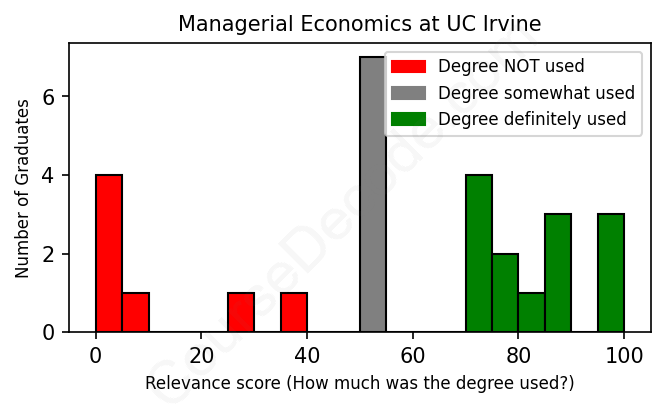
First, some facts. Of the Managerial Economics graduates from UC Irvine we've analyzed , here's how many have used (or NOT used) their degree in their career:

These are estimates based on AI analysis of 27 LinkedIn profiles (see below).
The verdict? Significantly below average. Overall, with an average relevance score of 55%, Managerial Economics graduates from UC Irvine have a much lower likelihood (-12%) of finding work in this field compared to the average graduate across all fields:
And for comparison, here's the chart for all profiles we've looked at across all degrees.
Also, after graduating, only 25% of these graduates have pursued further education other than another Bachelor's degree (such as a Masters degree or other), compared to the average across all profiles of 35%. This suggests a Bachelors degree is enough for most Managerial Economics graduates, and it's normal to look for work straight after graduation.
See the details:
|
Relevance score: 38% We think this person has NOT gone into a career related to their degree. We think this person has NOT gone into a career related to their degree.
DEGREE INFOGraduated in 2018 from UC Irvine with a Bachelor's degree in Managerial Economics. No other secondary education since. JOB HISTORY SINCE GRADUATIONRebar Detailer CMC May 2018 - Mar 2022 Project Manager  CMC Mar 2022 - Present ABOUTNo information provided. |
The top 10 most common jobs done by the graduates we've analyzed (ranked most common to least) are:
When looking at the job trends for people who graduated with a degree in Managerial Economics from UC Irvine, you’ll notice a mix of roles, though some areas stand out more than others. A significant number of graduates found themselves in positions related to finance, such as Analysts, Controllers, and Managers—jobs where complex economic principles and data analysis are vital. Roles like Financial Analyst at Goldman Sachs or Investment Banking Analyst at Tellson Securities highlight how applicable their education is for tackling real-world economic problems. There's also a noticeable presence in marketing and media strategy, where understanding the market dynamics is essential, like in roles as Media Strategist or Client Strategy Lead, which often align closely with the strategic thinking taught in their coursework.
However, not all paths taken by these graduates seem directly connected to Managerial Economics. Many found themselves in jobs like customer service or administrative positions that don't leverage their economic training daily. For instance, roles like Food Server or Accounts Payable Clerk don’t require the skills honed in their Managerial Economics classes. So, while many graduates do land roles that resonate with their studies, there's a notable portion who drift into unrelated fields, suggesting that while the degree provides solid tools for economic analysis and strategic decision-making, applying those skills in the job market can vary significantly depending on individual job choices.
Here is a visual representation of the most common words in job titles for Managerial Economics graduates (this is across all Managerial Economics graduates we've analyzed, not just those who went to UC Irvine):

Graduates from UC Irvine's Managerial Economics program seem to be carving out solid career paths, with many starting off in roles that relate to data analysis, finance, and strategic planning. For instance, a lot of them are diving into positions like financial analysts, marketing strategists, or operations roles right after graduation. It's common to see first jobs that are a mix of analyst positions or entry-level roles in marketing, finance, or client relations. This foundation typically sets them up for advancement, as they gather experience and skills relevant to the field.
Five to ten years down the line, many of these graduates have moved into more senior and specialized roles, such as product managers, senior financial analysts, and even department heads or directors. For example, some have risen through the ranks at companies like Cadence Design Systems and AutoNation, showing that the degree often opens doors to upward mobility. While there are definitely a few who veered off into roles that feel less related or lingered in entry-level positions, the overall trend indicates that a significant number are finding success and relevance in careers that leverage their educational background. So, if you’re considering Managerial Economics, it looks like a promising path to various career opportunities!
Honestly, a Bachelor’s degree in Managerial Economics at UC Irvine can be a bit challenging, but it really depends on your strengths and interests. If you like math and have a knack for analyzing data and economic principles, you'll probably find the coursework more manageable. However, be prepared for some heavy lifting with concepts like microeconomics, statistics, and business strategy. It's not the hardest major out there, but it definitely requires good time management and consistent studying to keep up with everything. Overall, it’s a solid mix of theory and practical application, so if you’re into that, it could be a great fit!
Most commonly, in the LinkedIn profiles we've looked at, it takes people 4 years to finish a Bachelor degree in Managerial Economics.
Looking at these UC Irvine graduates and their job paths, it's clear that they have varied experiences and income potentials. The earlier graduates, especially those in finance and marketing, have clawed their way up to pretty solid roles with good earning potential. For instance, the graduate from 2012 who moved from a minor league baseball player to a finance director at AutoNation is likely doing pretty well financially. However, some of the more recent grads, like the ones working as food servers or interns, might not be raking in the big bucks just yet. With those entry-level roles, it might take them a bit longer to hit that decent income mark. Overall, it seems like many are on promising trajectories, but there’s definitely a mix of financial success depending on the field and the timing of their career moves.
Here is a visual representation of the most common words seen in the "about" section of LinkedIn profiles who have a Bachelor degree in Managerial Economics (this is across all Managerial Economics graduates we've analyzed, not just those who went to UC Irvine). This may or may not be useful:

Here are all colleges offering a Bachelor degree in Managerial Economics (ordered by the average relevance score of their Managerial Economics graduates, best to worst) where we have analyzed at least 10 of their graduates:
| College | Score | Count |
|---|---|---|
 University of California, Los Angeles University of California, Los Angeles
|
76 | 12 |
 University of California, Riverside University of California, Riverside
|
68 | 14 |
 University of California, Davis University of California, Davis
|
66 | 44 |
 State University of New York College at Cortland State University of New York College at Cortland
|
61 | 11 |
 UC Irvine UC Irvine
|
55 | 27 |